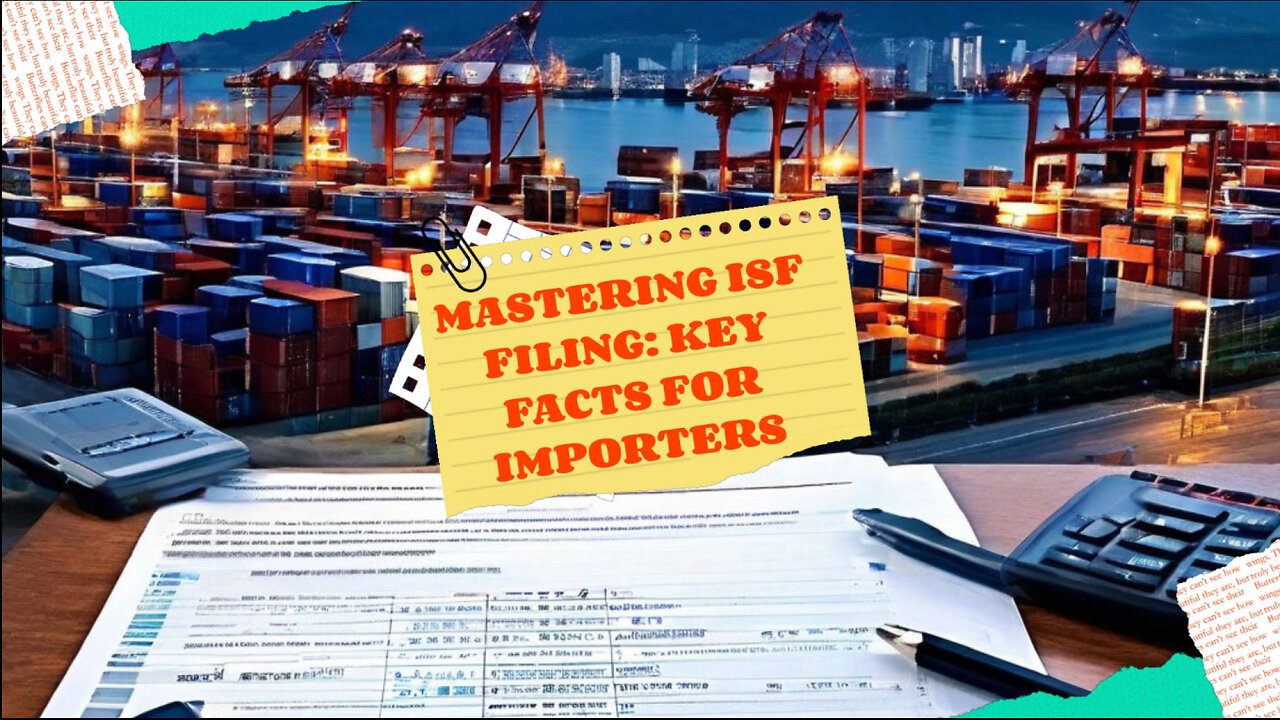Premium Only Content

The Key to Smoother Imports: Mastering ISF Filing and Temporary Importations
License To Import // 323-578-6432 // file@licensetoimport.com // www.licensetoimport.com
In today's episode, we delved into the regulatory landscape for temporary importations and the significant role of ISF filing in the customs brokerage process. Customs regulations are put in place to ensure compliance and security when importing goods into a country. Customs brokers navigate these regulations on behalf of their clients, and the Importer Security Filing (ISF) is an essential component of this process.
The ISF is a document that must be submitted to the US Customs and Border Protection (CBP) at least 24 hours prior to the loading of goods onto a vessel bound for the United States. It contains crucial information about the imported goods, including the shipper's and consignee's details, as well as a comprehensive description of the goods.
Customs bonds are also a crucial aspect of the customs brokerage process. A customs bond acts as a financial guarantee that ensures the payment of duties, taxes, and fees associated with the importation of goods. It serves as insurance for the CBP in case the importer fails to fulfill their obligations.
As a customs broker, it is your responsibility to ensure that your clients' ISF filings are accurate and timely. This involves gathering all the required information, such as the bill of lading, commercial invoice, and packing list, and entering it correctly into the ISF form. The accuracy and completeness of the ISF filing are vital, as customs officers rely on this information to assess the risk associated with the shipment and determine if further inspection is necessary.
In certain situations, amendments to the initial ISF filing may be required. For example, changes to the shipment's information, such as the container number or vessel name, must be promptly updated to reflect the most accurate and current data. Failure to comply with ISF filing requirements can result in fines or even the seizure of goods.
When it comes to temporary importations, customs brokers play a crucial role in navigating the specific regulations that apply. They ensure compliance with temporary importation rules, such as obtaining necessary permits and licenses and keeping track of the time limitations for re-exportation.
In conclusion, a thorough understanding of the regulatory landscape for temporary importations and the importance of accurate ISF filing is crucial for customs brokers. By completing ISF filings accurately and fulfilling customs bond requirements, customs brokers can ensure a smooth and efficient customs clearance process for their clients. Thank you for tuning in to License to Import, and we hope this episode has provided valuable insights into customs brokerage and the international trade industry. Don't forget to subscribe and hit the bell icon to stay updated with our upcoming content. See you next time!
#LicenseToImport #CustomsBrokerage #ISFfiling #RegulatoryLandscape #ImportCompliance #TemporaryImportations #CustomsBond #CustomsClearance #InternationalTrade #ImportRegulations
Video Disclaimer Here: This video is solely for education and is not endorsed by any US government agency.
-
 1:29:47
1:29:47
Real Coffee With Scott Adams
4 hours agoEpisode 2669 CWSA 11/24/24
30.6K24 -
 13:52
13:52
Hershberger's Kitchen
16 hours agoTwo Delicious Dip and Spread Recipes to Try, Inspirational Thought
15K2 -
 3:41:05
3:41:05
Sacred Sage
7 hours ago $2.87 earnedDaz3D: Attempting to Finish Zoe Conversation!
26.1K1 -
![[Stream #19 ] Gaming, Chatting, you know the drill!](https://1a-1791.com/video/s8/1/9/o/E/e/9oEeu.0kob-small-Stream-Sour-Pickle-100-Foll.jpg) LIVE
LIVE
OneRandomDolly
5 hours ago[Stream #19 ] Gaming, Chatting, you know the drill!
378 watching -
 11:07
11:07
TimcastIRL
1 day agoElon Musk Suggests He’ll BUY MSNBC, Joe Rogan Will REPLACE Rachel Maddow
67.4K52 -
 34:24
34:24
The Rubin Report
22 hours agoFormer CEO: The Aftermath of Vice Media & What's Next for Mainstream Media | Shane Smith
82.7K36 -
 9:14:23
9:14:23
tacetmort3m
1 day ago🔴 LIVE - BECOMING THE UNTOUCHABLE (RADIATION WHO?) - STALKER 2 - PART 3
28.9K6 -
 16:05
16:05
China Uncensored
18 hours agoAnother Car-Ramming Strikes Outside a Chinese School!
24.4K12 -
 9:26
9:26
Dr. Nick Zyrowski
9 hours agoAnti Inflammatory Foods | You MUST Eat These!
18.3K5 -
 15:40
15:40
Bearing
5 hours agoEnd Stage Trump Derangement | Rosie O'Donnell is NOT Doing Well 😬
17.4K93